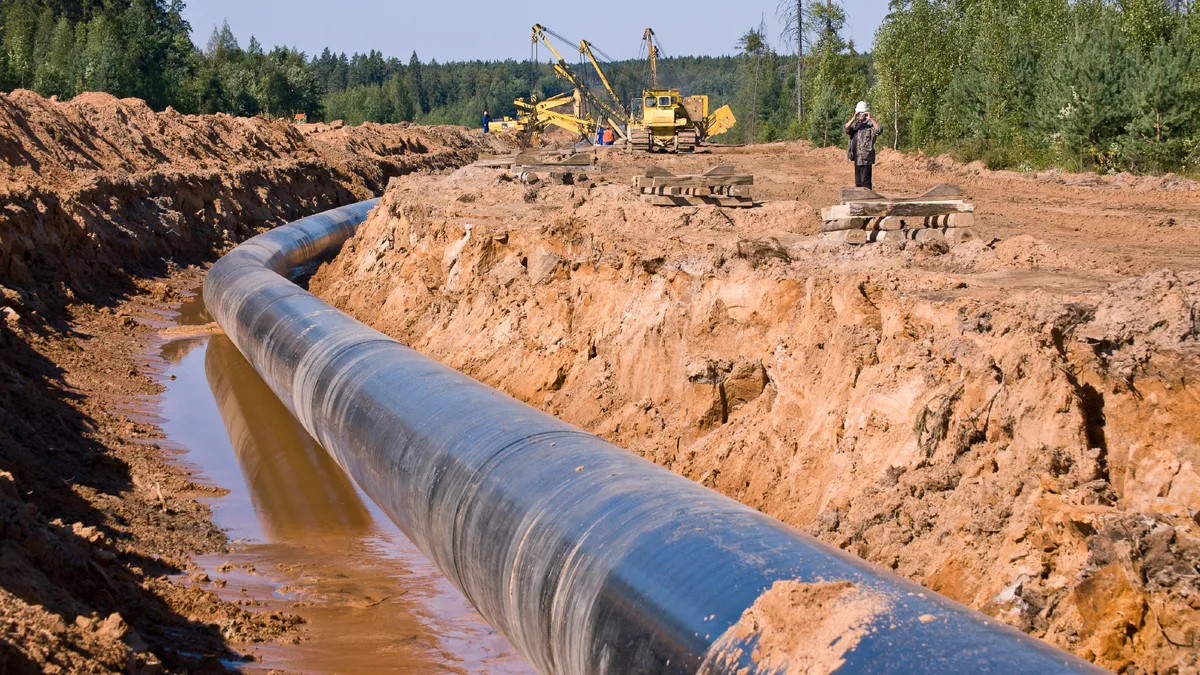Dive Brief:
-
Duke Energy and Dominion Energy announced on Sunday they would cancel the Atlantic Coast Pipeline due to expected delays and cost uncertainty, as estimates rose from $4.5 billion to $8 billion following several legal challenges.
-
Last month, the Supreme Court settled a permitting dispute in a 7-2 ruling regarding the pipeline’s path crossing beneath the Appalachian Trail. At the time, opponents of the project maintained many other permitting hurdles remained for the project.
-
Also on Sunday, Dominion announced the sale of its natural gas transmission and storage assets to a Berkshire Hathaway affiliate for $9.7 billion, including the assumption of $5.7 billion of debt. The transaction does not include Dominion's interest in the Atlantic Coast Pipeline.
Dive Insight:
The project would have provided additional natural gas capacity needed in the region, according to Duke and Dominion.
Without the Atlantic Coast Pipeline, Duke will continue investing in its electric power and gas distribution businesses, spokesperson Tammie McGee told Utility Dive.
"We will need existing gas infrastructure in the state [of North Carolina] as well as alternative supplies. Our Natural Gas Business remains central to our long-term strategy, and we will continue to count on our employees to deliver industry-leading service to our customers," she said in an email.
The utilities said the Atlantic Coast Pipeline was threatened by the uncertainty of legal decisions such as the U.S. District Court for the District of Montana’s ruling to overturn federal authority for projects crossing bodies of water. The Ninth Circuit indicated that an appeal of that decision would be unlikely to be successful, according to the joint press statement.
"Like too many shovel-ready projects before it, the Atlantic Coast Pipeline faced legal and permitting challenges waged without merit by activists, and these challenges ultimately cost Americans along its route the environmental, employment, and economic benefits that modern pipeline projects bring," the American Petroleum Institute (API) and North America’s Building Trades Unions said in a joint statement.
API did not respond to inquiries ahead of publication about how the additional need for capacity will best be met in the region.
The project has been delayed nearly three and a half years, with a current in-service date for early 2022. Opponents of the project remained skeptical that the pipeline could be completed in that time.
Duke and Dominion attributed the timing delays and the significant cost increases to the "series of legal challenges" the Atlantic Coast Pipeline faced.
"These lawsuits and decisions have sought to dramatically rewrite decades of permitting and legal precedent including as implemented by presidential administrations of both political parties," the joint statement said.
Local environmental advocates welcomed the cancellation announcement.
"The Atlantic Coast Pipeline was never needed, and the facts have never been more clear: fracked gas has no role in our energy future," Tom Cormons, Appalachian Voices executive director, said in a statement.
The head of the U.S. Department of Energy bemoaned the loss of new jobs and investment in natural gas in Pennsylvania, West Virginia and Ohio from the potential 600-mile project.
"The well-funded, obstructionist environmental lobby has successfully killed the Atlantic Coast Pipeline, which would have lowered energy costs for consumers in North Carolina and Virginia by providing them with an affordable, abundant, and reliable natural gas supply from the Appalachian region," DOE Secretary Dan Brouillette said in a statement. "As Secretary, I will continue to fight for expanded energy infrastructure in this country."
While the utilities have established clean energy goals, Duke reiterated in its comments the role of natural gas as a resource: "[N]atural gas is important to achieve our net-zero carbon goal and to facilitate the retirement of coal generation," McGee said.
Environmental advocates are urging the utilities away from the fuel type, after declaring a "historic victory" over Atlantic Coast Pipeline.
"As they abandon this dirty pipe dream, Dominion and Duke should now pivot to investing more in energy efficiency, wind and solar—that’s how to provide jobs and a better future for all," Gillian Giannetti, an attorney in the Sustainable FERC Project at the Natural Resources Defense Council, said in a statement.
CORRECTION: A previous version of this article misstated the natural gas business segment that Dominion sold to Berkshire Hathaway. Dominion sold its natural gas storage assets and transmission pipelines.














